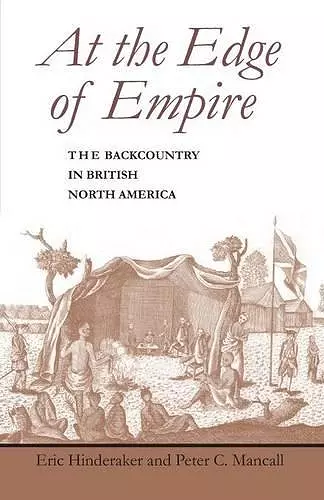At the Edge of Empire
The Backcountry in British North America
Eric Hinderaker author Peter C Mancall author
Format:Paperback
Publisher:Johns Hopkins University Press
Published:9th May '03
Currently unavailable, and unfortunately no date known when it will be back

This is undoubtedly the best brief synthesis available on the interactions between Native and European groups on the colonial frontier. Scholars will admire its sophistication, scope, and conceptual strength; students will appreciate its brevity and readability. A compelling story, engagingly told. -- Fred Anderson, University of Colorado, Boulder Eric Hinderaker and Peter Mancall follow the western periphery of the British empire across two hundred years of shifting terrain. Their collaboration has produced a superb new synthesis that brings clarity to the chaotic history of the colonial backcountry, mapping the collisions and collusions that occurred 'at the edge of empire,' and making clear that the evolution of the backcountry decisively shaped the legacy of colonialism in North America. -- Stephen Aron, UCLA, Director of the Autry Institute for the Study of the American West
The first book in a new Johns Hopkins series, Regional Perspectives on Early America, At the Edge of Empire explores one of British America's most intriguing regions, both widening and deepening our understanding of North America's colonial experience.During the course of the seventeenth century, Europeans and Native Americans came together on the western edge of England's North American empire for a variety of purposes, from trading goods and information to making alliances and war. This blurred and constantly shifting frontier region, known as the backcountry, existed just beyond England's imperial reach on the North American mainland. It became an area of opportunity, intrigue, and conflict for the diverse peoples who lived there. In At the Edge of Empire, Eric Hinderaker and Peter C. Mancall describe the nature of the complex interactions among these interests, examining colorful and sometimes gripping instances of familiarity and uneasiness, acceptance and animosity, and cooperation and conflict, from individual encounters to such vast undertakings as the Seven Years' War. Over time, the European settlers who established farms and trading posts in the backcountry displaced the region's Native inhabitants. Warfare and disease each took a horrifying toll across Indian country, making it easier for immigrants to establish themselves on lands once peopled only by Native Americans. Eventually, these pioneers established economically, culturally, and politically self-sufficient communities that increasingly resented London's claims of sovereignty. As Hinderaker and Mancall show, these resentments helped to shape the ideals that guided the colonists during the American Revolution. The first book in a new Johns Hopkins series, Regional Perspectives on Early America, At the Edge of Empire explores one of British America's most intriguing regions, both widening and deepening our understanding of North America's colonial experience.
Mr. Hinderaker and Mr. Mancall successfully challenge the negative reputation that has clung to the backcountry. They demonstrate that it was an economically vital part of colonial American society... Thanks to the authors' impressive scholarship we now understand how a place once despised as a 'backcountry' quickly became the dynamic frontier of economic and social development in the United States. -- Evan Haefeli Washington Times This short, engaging text provides a useful survey of key themes for an often-neglected region, the backcountry... Particular attention is focused on the numerous wars of the period; the book has excellent short discussions of Bacon's Rebellion, Metacom's War, the Yamasee War, and the Seven Years' War, among other conflicts. Although the idea of the 'backcountry' is by definition a European concept, the authors skillfully outline the impact of trade and war on both Native and Colonial communities. Choice 2004 A fine synthesis of a vastly complex subject, and students assigned this volume will benefit from the authors' successful integration of the backcountry into the broader history of English imperialism in America... Extremely informative and useful. -- Michael Leroy Oberg History: Reviews of New Books An acutely written, meticulously researched, scholarly history which closely examines the manifold causes of conflict between Native Americans and Europeans, as well as the ordinary situations of daily life which were to significantly contribute to the American Revolution. Midwest Book Review Eric Hinderaker and Peter Mancall have written a concise, synthetic narrative of the backcountry from Georgia to Maine. In the process, they successfully argue for its centrality in colonial American history. -- Krista Camenzind Pennsylvania Magazine of History and Biography 2004 Sophisticated but straightforward, At the Edge of Empire is an excellent introduction to the vital role that the backcountry played in colonial American history. -- Kathleen DuVal New England Quarterly Takes a fresh approach to it subject matter... sheds light on the wider Atlantic context in which eighteenth-century British America developed... Hinderaker and Mancall describe the rapid and often violent mixing of cultures on a frontier that imperial authorities could barely control. -- Timothy J. Shannon William and Mary Quarterly 2005 Eric Hinderaker and Peter C. Mancall have successfully synthesized the complex world of British backcountry resettlement in a brief, readable format.Eric Hinderaker and Peter C. Mancall -- Gray H. Whaley Journal of World History 2005 At the Edge of Empire is undoubtedly the best available introduction to its difficult subject for scholars and students alike. -- Michael Ziser Eighteenth-Century Studies 2005 Intriguing book. -- Gregory Evans Dowd North Carolina Historical Review 2006 Hinderaker and Mancall write a compact synthesis of recent historical monographs that open the reader to the diversity of new scholarship concerning two hundred years of British colonial history. -- David Curtis Skaggs Journal of Northwest Ohio History 2008
ISBN: 9780801871375
Dimensions: 216mm x 140mm x 12mm
Weight: 272g
224 pages